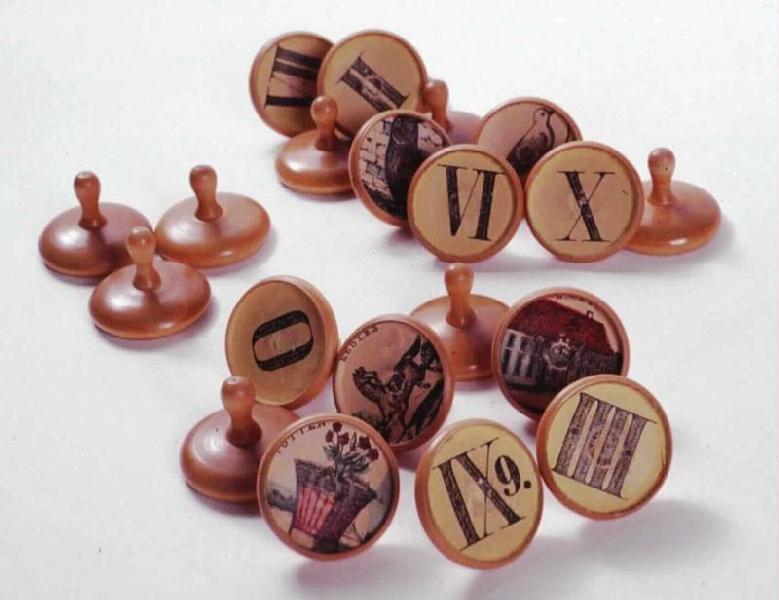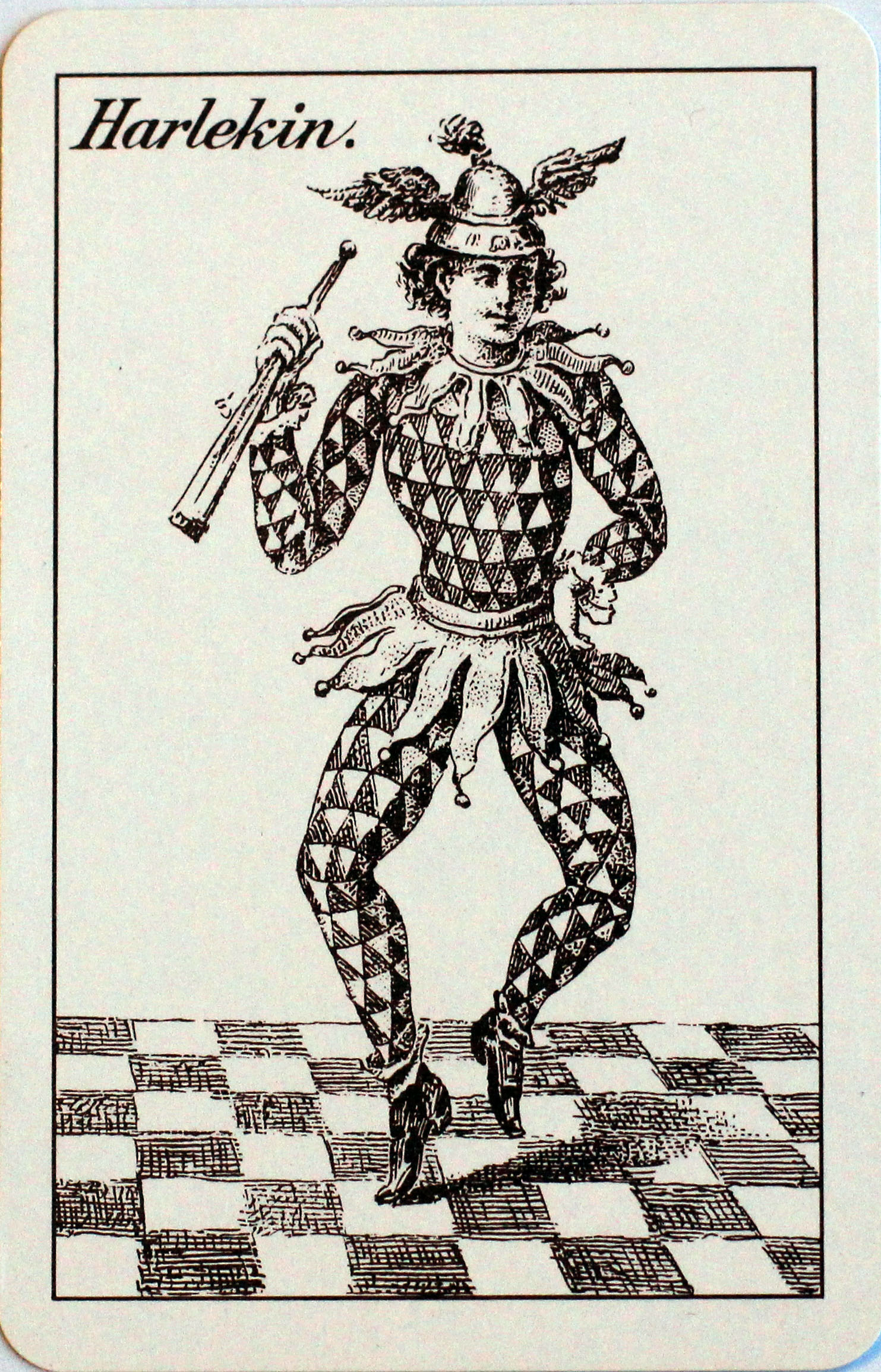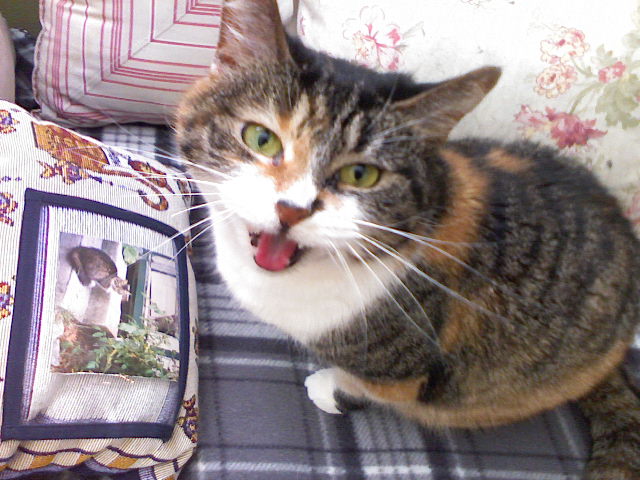|
Cuccú
Gnav is a traditional game that is played with either cards or wooden pieces. Related games are Gnaio, Cuccù, Hexenspiel or Vogelspiel, Kille (also called Cambio, Campio, Camphio, Camfio or Kamfio), Coucou and Ranter Go Round. The game can be played by 20 or more players, and a minimum of two. History of the game The earliest reference to the game dates to 1490 France where it was known by the name of Mécontent (Malcontent) and was played with a standard 52-card deck. Such a game is still played today in France as Coucou ("cuckoo") and also in English speaking countries as Cuckoo or Ranter-Go-Round. The earliest reference of Malcontento in Italy dates from 1547 (“Capriccio in laude del Malcontento” by Luigi Tansillo of Naples). It was in the early 18th century that the first dedicated decks for Cuccu (Cuccù, Cucco, Cucu’ or Stu) appeared which consisted of 38 cards. The oldest known written regulation dates back to 1717 by the Al Mondo company. It was included in ... [...More Info...] [...Related Items...] OR: [Wikipedia] [Google] [Baidu] |
Kille (card Game)
Kille (pronounced or ), also called Harlequin, Cambio, Campio, Kambio or Kamfio, is a game played with special playing cards, dating from a mediaeval French gambling game. In Sweden, the game had its heyday during the 1750s, but it is one of the oldest card games still played.Insert sheet in Killelek from Offason. ''Regler för Killespelet – Historik''. Dan Glimne. History The French gambling game of Coucou was invented in France around 1500 and spread across Central Europe. In the late 17th century, an Italian manufacturer produced a deck of cards adapted for the game. The game was named Cuccú after its highest card. Cuccú had 38 cards and two cards of each denomination (thus 19 unique denominations). Eleven of the cards in each suite were numeral cards, numbered 0-10. The other cards were picture cards, two of which – the Bucket and the Masque – ranked lower than the numerals. Five of the cards were ranked higher: the Inn, Cat, Horse, Guard, and Cuckoo (highest). T ... [...More Info...] [...Related Items...] OR: [Wikipedia] [Google] [Baidu] |
Coucou
Coucou (also called Cuckoo, As Qui Court or Hère) is an historical French card game that uses a pack of 32 or 52 cards and is played by five to twenty players. It is unusual for being played with only a single card in hand. As a shedding game, there is only one winner who may claim the stakes, if there are any. History The earliest reference to the game dates to 1490 France where it was known by the name of Mécontent ("Malcontent") and was played with a standard 52-card deck. The first rules appear under the name Hère in 1690Furetière (1690). and as Coucou in 1721. The name As Qui Court appears in the mid-19th century, but the name Coucou ("cuckoo") persisted and the game is still played in France today under that name. The game migrated to England by 1881 as Ranter-Go-Round, but is now also known as Cuckoo. Cards The game uses a regular 52-card pack, or a smaller 32-card deck (with 2s through 6s absent) if fewer than seven are playing. Suits are not relevant; only the c ... [...More Info...] [...Related Items...] OR: [Wikipedia] [Google] [Baidu] |
Ranter Go Round
Ranter-Go-Round is a primitive gambling game and children's game using playing cards. It is known in most European countries as Cuckoo; the French variant being called Coucou. Other English-language names include Chase the Ace and, in America, Screw Your Neighbor which, however, is a name also used for other games. It is related to the dedicated deck card or tile games of Gnav and Killekort. History Ranter Go Round is described as early as 1881. The game "is said to have been first played in Cornwall," however Cuckoo has been played in Europe since at least the 17th century, often with special cards. An 1882 account describes Ranter Go Round as "a first-rate game for a winter evening." Players have three lives in the form of counters, receive one card each and exchange with their left-hand neighbours, the dealer exchanging with the stock. Players may stand i.e. refuse to exchange if they believe they have a card high enough not to lose. There are no cards with special privil ... [...More Info...] [...Related Items...] OR: [Wikipedia] [Google] [Baidu] |
Ranter-Go-Round
Ranter-Go-Round is a primitive gambling game and children's game using playing cards. It is known in most European countries as Cuckoo; the French variant being called Coucou. Other English-language names include Chase the Ace and, in America, Screw Your Neighbor which, however, is a name also used for other games. It is related to the dedicated deck card or tile games of Gnav and Killekort. History Ranter Go Round is described as early as 1881. The game "is said to have been first played in Cornwall," however Cuckoo has been played in Europe since at least the 17th century, often with special cards. An 1882 account describes Ranter Go Round as "a first-rate game for a winter evening." Players have three lives in the form of counters, receive one card each and exchange with their left-hand neighbours, the dealer exchanging with the stock. Players may stand i.e. refuse to exchange if they believe they have a card high enough not to lose. There are no cards with special privil ... [...More Info...] [...Related Items...] OR: [Wikipedia] [Google] [Baidu] |
Sailing
Sailing employs the wind—acting on sails, wingsails or kites—to propel a craft on the surface of the ''water'' (sailing ship, sailboat, raft, windsurfer, or kitesurfer), on ''ice'' (iceboat) or on ''land'' (land yacht) over a chosen course, which is often part of a larger plan of navigation. From prehistory until the second half of the 19th century, sailing craft were the primary means of maritime trade and transportation; exploration across the seas and oceans was reliant on sail for anything other than the shortest distances. Naval power in this period used sail to varying degrees depending on the current technology, culminating in the gun-armed sailing warships of the Age of Sail. Sail was slowly replaced by steam as the method of propulsion for ships over the latter part of the 19th century – seeing a gradual improvement in the technology of steam through a number of stepwise developments. Steam allowed scheduled services that ran at higher average speeds than sail ... [...More Info...] [...Related Items...] OR: [Wikipedia] [Google] [Baidu] |
Sweden
Sweden, formally the Kingdom of Sweden,The United Nations Group of Experts on Geographical Names states that the country's formal name is the Kingdom of SwedenUNGEGN World Geographical Names, Sweden./ref> is a Nordic country located on the Scandinavian Peninsula in Northern Europe. It borders Norway to the west and north, Finland to the east, and is connected to Denmark in the southwest by a bridgetunnel across the Öresund. At , Sweden is the largest Nordic country, the third-largest country in the European Union, and the fifth-largest country in Europe. The capital and largest city is Stockholm. Sweden has a total population of 10.5 million, and a low population density of , with around 87% of Swedes residing in urban areas in the central and southern half of the country. Sweden has a nature dominated by forests and a large amount of lakes, including some of the largest in Europe. Many long rivers run from the Scandes range through the landscape, primarily ... [...More Info...] [...Related Items...] OR: [Wikipedia] [Google] [Baidu] |
Miaow
A meow or miaow is a cat vocalization. ''Meows'' may have diverse tones and are sometimes chattered, murmured or whispered. Adult cats rarely meow to each other, so an adult cat meowing to human beings is probably a post-domestication extension of meowing by kittens: a call for attention. The meow can be assertive, plaintive, friendly, bold, welcoming, attention-soliciting, demanding, or complaining. It can even be silent, where the cat opens its mouth but does not vocalize. Just as humans may verbalize exhaustively when they are happy, so can cats. According to ''The Purrington Post'', a chatty cat is likely happy too. A mew is a high-pitched meow often produced by kittens. It is apparently used to solicit attention from the kitten's mother, and adult cats may use it as well. The mew is similar to what is described in Brown et al. 1978 as an isolation call. By around three to four weeks of age kittens do not mew when at least one littermate is present, and at four to five ... [...More Info...] [...Related Items...] OR: [Wikipedia] [Google] [Baidu] |
Miao
Miao may refer to: * Miao people, linguistically and culturally related group of people, recognized as such by the government of the People's Republic of China * Miao script or Pollard script, writing system used for Miao languages * Miao (Unicode block), a block of Unicode characters of the Pollard script * '' Miào'' (庙), a Chinese temple * Miáo (surname), a Chinese surname written 苗 * Miào (surname), a Chinese surname written 繆 * Miao, Chongming County (庙镇), town in Chongming District, Shanghai, China * Miao, Changlang, town in Arunachal Pradesh, India * Roman Catholic Diocese of Miao, in India * ''Miao'' (album), album by Candy Lo * " Mr. Miao", a short story by Pu Songling See also * Miao Rebellion (other) * Miao Miao Miao Miao () (born 14 January 1981, Tianjin, China) is an Australian table tennis player who represented Australia at the Sydney, Athens, Beijing and London Olympic Games. Her best Olympic result was the quarter finals of the double ... [...More Info...] [...Related Items...] OR: [Wikipedia] [Google] [Baidu] |
Italian Language
Italian (''italiano'' or ) is a Romance language of the Indo-European language family that evolved from the Vulgar Latin of the Roman Empire. Together with Sardinian, Italian is the least divergent language from Latin. Spoken by about 85 million people (2022), Italian is an official language in Italy, Switzerland (Ticino and the Grisons), San Marino, and Vatican City. It has an official minority status in western Istria (Croatia and Slovenia). Italian is also spoken by large immigrant and expatriate communities in the Americas and Australia.Ethnologue report for language code:ita (Italy) – Gordon, Raymond G., Jr. (ed.), 2005. Ethnologue: Languages of the World, Fifteenth edition. Dallas, Tex.: SIL International. Online version Itali ... [...More Info...] [...Related Items...] OR: [Wikipedia] [Google] [Baidu] |
Norway
Norway, officially the Kingdom of Norway, is a Nordic country in Northern Europe, the mainland territory of which comprises the western and northernmost portion of the Scandinavian Peninsula. The remote Arctic island of Jan Mayen and the archipelago of Svalbard also form part of Norway. Bouvet Island, located in the Subantarctic, is a dependency of Norway; it also lays claims to the Antarctic territories of Peter I Island and Queen Maud Land. The capital and largest city in Norway is Oslo. Norway has a total area of and had a population of 5,425,270 in January 2022. The country shares a long eastern border with Sweden at a length of . It is bordered by Finland and Russia to the northeast and the Skagerrak strait to the south, on the other side of which are Denmark and the United Kingdom. Norway has an extensive coastline, facing the North Atlantic Ocean and the Barents Sea. The maritime influence dominates Norway's climate, with mild lowland temperatures on the se ... [...More Info...] [...Related Items...] OR: [Wikipedia] [Google] [Baidu] |
Exchange
Exchange may refer to: Physics *Gas exchange is the movement of oxygen and carbon dioxide molecules from a region of higher concentration to a region of lower concentration. Places United States * Exchange, Indiana, an unincorporated community * Exchange, Missouri, an unincorporated community * Exchange, Pennsylvania, an unincorporated community * Exchange, West Virginia, an unincorporated community Elsewhere * Exchange Alley, in London, United Kingdom * Exchange District, a historic area in Winnipeg, Manitoba, Canada Business and economy *''Bureau de change'', a business whose customers exchange one currency for another *Cryptocurrency exchange, a business that allows customers to trade cryptocurrencies or digital currencies. *Digital currency exchangers (a.k.a. DCEs or Bitcoin exchanges), businesses that allow customers to trade digital currencies for other assets, such as conventional fiat money, or different digital currencies *Exchange (economics) *Exchange (organized mar ... [...More Info...] [...Related Items...] OR: [Wikipedia] [Google] [Baidu] |
Cambio (card Game)
Cambio is the Spanish word for "change", and may refer to: ;Publications * ''Cambio'' (magazine), a Colombian political magazine *Cambio (newspaper), a Bolivian newspaper ;Entertainment and games * ''Cambio'' (band), a Filipino band *Perissone Cambio, 16th century musician *Built By Girls, formerly known as Cambio.com, an online news/entertainment website (AOL brand) * Cambio (card game), early name for the popular Swedish game of Kille ;Other *Cambio 90, a Peruvian political party * Currency exchange, term associated with exchanging one currency for another *Cambio Healthcare Systems Cambio Healthcare Systems is a healthcare company based in Linköping. It has offices in Reading, Berkshire, Aarhus, Stockholm, Copenhagen and Motala. It provides computerised clinical decision support services. It acquired Cayder, a British h ..., a Swedish healthcare company See also * Cambia (other) {{dab ... [...More Info...] [...Related Items...] OR: [Wikipedia] [Google] [Baidu] |




